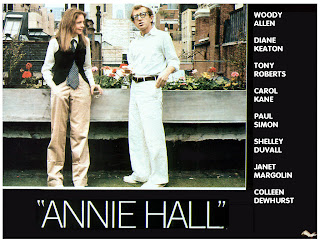

His career spans five decades and has earned him fourteen Academy Award nominations. New York native Woody Allen has won eight BAFTA (British Academy of Film) awards and the prestigious Palme des Palmes, the Cannes Film Festival's lifetime achievement award. Allen can be credited with 30 + films; as well as author to numerous plays and short stories.
From my research, Woody Allen has continually downplayed the degree of similarity between himself and his cinematic counterpart, but Allen is definitely an Auteur, serving as director, screenwriter and star for the majority of his films. Allen exercises an infamously tight control over all facets of his work – casting, writing, shooting and editing. For each film he has done the directing of the movie, chosen the cast, the locations and the drama that takes place and how the drama is dealt with, written or co-written the screenplay; had final say on all the technical aspects of the filming process; done the final editing and participated in the marketing and distribution process. In fact I find very few people have had so much control over a cinematic project as Allen has.
I believe the major themes of Allen's movies is that each of us is responsible for the consequences of the choices we make as a person. “Annie Hall" was his first film to contain believable, if exceptionally neurotic, people. Allen’s 1977 breakthrough film was a major commercial hit as well as a critical success. “Annie Hall” introduced, for the first time in a serious manner, many of the integral themes that would concern Allen throughout the remainder of his career. A lot of Allen’s film is based on his idea of philosophy of life. You see in Allen films as well as his life that he deals with such issues as his idea of fate, death, love, and his argument battle with god.
Other themes include: his obsession with existential issues of freedom, responsibility, anguish, guilt and alienation; a constant awareness of our own mortality; issues with obtaining and keeping romantic love, sexual desire and changing cultural gender roles. He also exhibits a preoccupation with understanding human thinking and behaving.
A snippet from “Annie Hall” details greatly one of Allen real life fascinations; human mortality.
Doc: Why are you depressed, Alvy?
Mother: Tell doctor [?] It's something he read.
Doc: Something you read, heh?
Alvy: The universe is expanding.
Doc: The universe is expanding?
Alvy: Well, the universe is everything, and if it's expanding, someday it will break apart and that would be the end of everything!
Mother (shouting): What is that your business? (To doctor) He stopped doing his homework.
Alvy: What's the point?
Mother: What has the universe got to do with it? You're here in Brooklyn! Brooklyn is not expanding!
– Annie Hall
This quote sums up Allen's philosophy – he undercuts his own mortal angst with ridiculous humor that provides comic relief and is in its own way an answer to these unanswerable questions he has imposed on the viewer, as well as himself. Allen most often employs psychoanalytic theory in his (often dialogue heavy) scripts. The thesis of The Denial of Death (a psychoanalytic text which Alvy buys Annie and reflects on after they separate in Annie Hall) cites as two strategies of evading mortality – sexuality, which Allen has embraced wholeheartedly in both his work and life, and the belief in and service to God, which he has not. Other critics have noted the parallels with philosophers such as Socrates and Jean-Paul Sartre, the latter with regard to the impossibility of authentic romantic commitment.
While many of the elements Annie Hall are present in Allen’s earlier work, it is here where it is more visually satisfying. The film may be seen as a series of therapy sessions with Alvy Singer; the film main character played by Allen himself. It is viewed as Alvy as the patient, and the audience as the therapist. Like many psychotherapy patients, Alvy is always trying to validate his actions. Our job as viewers is to act as analysts and perceive his troubles as the characters on the screen.
"Annie Hall," is actually based loosely on Allen's relationship with the film's star, Diane Keaton; therefore leading many in the media as well as theater goers to believe the film to be a pseudo-autobiography. But Allen takes a literal-minded stance about the connection between his real life and his work; the films are not autobiographical, he says, because the events they depict didn't happen. The problem of Woody Allen's being identified with his roles began during his days as a stand-up comic in the 1960's. I found out that Allen had a history in comedy as a stand up, and found it was easier and more productive for him to go out on stage and just “talk’ to the audience; As if to have one-big conversation. It was not planned to mirror his stage act so closely to his real life. Woody Allen draws on his own fixations because they are so easy for him to write about, being that they truly do perplex him in real life; making him the quintessential American Auteur.

No comments:
Post a Comment
Note: Only a member of this blog may post a comment.